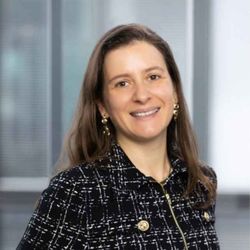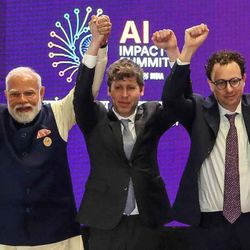Share

The Times Tech Podcast
TrueMed’s Calley Means: “Sugar, kids, and the crime of the century”
Season 5, Ep. 2
•
The Sunday Times tech correspondent Danny Fortson brings on Callery Means, founder of TrueMed, to talk about his early days in politics (4:20), how the food industry avoided sugar taxes (7:45), the links between industry and institutions of trust (12:00), the “food compass” and why it says Lucky Charms is better than chicken breast (18:00), why we consume 100 times more sugar than we used to (23:45), what TrueMed is (29:45), how he aims to rebalance incentives in the healthcare industry (35:10), food as medicine (39:00), and trying to spark a movement (43:00).
More episodes
View all episodes

Bonus episode: Agentic AI explained – The next phase of artificial intelligence
26:03|This episode of The Times Tech podcast is sponsored by PwC.Artificial intelligence is entering a new phase. It’s no longer just about chatbots generating text or analysing data. The next frontier is agentic AI systems that can coordinate tasks, make decisions and act with a degree of autonomy. In this sponsored bonus episode, brought to you by PwC, Katie Prescott speaks to Lilia Christoff, Partner for AI and Data at PwC, about what agentic AI really means in practice.
AI safety meets OpenClaw – what India’s AI summit tells us
39:23|As world leaders and tech bosses gather for India’s AI Impact Summit, Danny Fortson and Mark Sellman ask if these global summits are shaping AI or struggling to keep up with it? They also hear from Carina Prunkl, lead author of the new International AI Safety Report, about risks, jobs, autonomy and whether safeguards are keeping pace with technology. Plus, OpenAI snaps up viral agent OpenClaw. Image: GettyEmail us: techpod@thetimes.co.uk
Nikola Mrksic on PolyAI, Super Bowl ads, and the future of voice AI
41:35|Nikola Mrksic, CEO of Nvidia-backed London startup PolyAI, joins Danny and Katie to talk about AI voice assistants transforming customer service. He explains why voice AI is finally working, how PolyAI handles real-world calls and real-world accents, and what happens to jobs when bots can do the work of thousands. Plus, the ‘SaaSpocalypse’ – the $1 trillion sell-off that signals investors may finally believe AI is eating software.Image: PolyAI
Bonus episode: The ‘secret sauce’ of success - With Octopus Energy CEO, Greg Jackson
35:06|Today’s episode is from The Business – The Times’ flagship podcasts covering business, finance and the economy.Octopus Energy has gone from market entrant to market leader in just 10 years. Greg Jackson, chief executive and co-founder is at the forefront of this business success story. The secret sauce? It’s nothing to do with energy - it’s the Kraken software that links the company to its customers and suppliers. So how did he do it? Why does he think 'spaghetti stacks' of ancient software are what’s holding so many businesses back? And what plans does he have to float Kraken? From memories of his failed career as a game designer, why corporate life can be addictive - and why he thinks business leaders should be optimistic in a challenging world, Dom and Katie hear his lessons from the frontline.Presenters:Dominic O’Connell, columnist and business presenter, Times RadioKatie Prescott, Technology Business Editor, The Times and host of the Times Tech PodcastGuest:Greg Jackson, CEO and co-founder, Octopus EnergyProducer: Miriam HallSenior Producer: Julia JohnsonExecutive Producer: Kate FordGet in touch: thebusiness@thetimes.com
Is OpenClaw about to burst the AI bubble?
41:11|A new open-source AI agent called OpenClaw has set Silicon Valley buzzing and with a single line of code, anyone can use it. Does this free tool threaten the AI business models behind trillion-dollar Big Tech IPOs, and could it signal a looming AI bubble? Plus, Danny Fortson and Katie Prescott also speak to Jurgi Camblong, founder and CEO of SOPHiA Genetics, about how AI is already being used in hospitals to decode complex medical data and transform cancer diagnosis and care.Photo: GettyClip: @AlexFinn on X.com
Is AI growing too fast for humanity?
40:58|Are we heading for the next ChatGPT moment? Anthropic CEO Dario Amodei, has sparked debate about the growth of AI and its acceleration into a risky new phase. But is it real danger or Silicon Valley hype? Danny Fortson and Katie Prescott are joined by Barney Hussey-Yeo, CEO of UK fintech Cleo, on what it’s actually like building with AI right now and whether society is ready for the next turning point. Plus, the backlash over tech CEOs cozying up to US President Donald Trump amid anger over his immigration crackdown.Image: Cleo
Can Europe rely on Silicon Valley in the age of Trump tariffs?
37:23|World leaders in Davos are talking about 'tech sovereignty', but can Europe or the UK really achieve digital autonomy when so much of the AI and cloud infrastructure is controlled by a handful of US firms? Danny and Katie talk to Hany Farid about the geopolitics of tech, and the fear of an 'AI kill switch' - is this scaremongering or a real concern?Guest: Hany Farid, UC Berkeley professor and Co‑Founder & Chief Science Officer at GetReal Security.Image: Getty
Grok, deepfakes and who should police AI
38:56|What happens when AI gets it wrong? After a backlash over the misuse of Elon Musk’s AI tool Grok, new restrictions have been imposed on editing images of real people. Is this a sign that AI regulation is lagging, and who should be in charge – governments or Silicon Valley? This week, Danny and Katie are joined by AI computer scientist Kate Devlin from King’s College London to discuss why this moment could be a turning point for global AI rules.Image: Getty
Tech in 2026 – AI winners, losers and what happens next
36:00|What will tech look like in 2026 and are we heading for an AI bubble, or a boom? To gaze into the crystal ball for the year ahead, Katie and Danny speak to VCs Hannah Seal from Index Ventures and Jon Callaghan of True Ventures in Silicon Valley, and get them to make their predictions for the year ahead and the innovations to watch out for – AI solving healthcare? Robots replacing brickies?Image: Getty